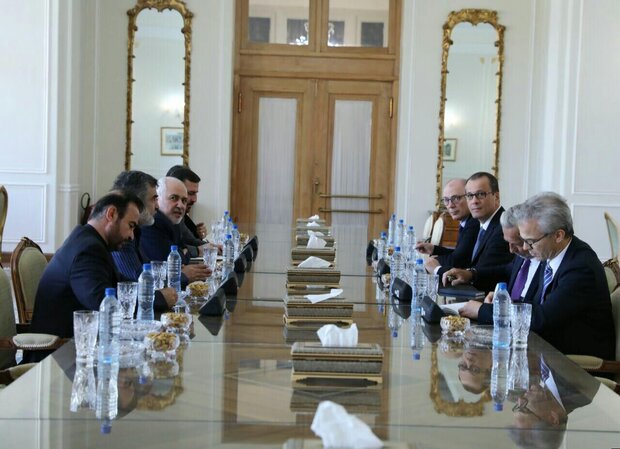Sunday 8 September 2019 - 16:25
Story Code : 358560
Iran urges IAEA to uphold professionalism, impartiality
Acting director general of the UN nuclear agency, Cornel Feruta, met with Zarif in Tehran on Sunday.
In the gathering, Iran�s top diplomat highlighted the country�s close cooperation with the IAEA, which has resulted in successive reports from the UN nuclear agency confirming the Islamic Republic�s compliance with the Joint Comprehensive Plan of Action (JCPOA), stressing the need for the continuation of cooperation at this juncture.
Zarif also called on the IAEA to observe the principles of professional work, maintain the confidentiality of activities, and keep doing its duties impartially.
The foreign minister also underscored that Iran�s decision to reduce commitments to the JCPOA in response to the EU�s failure to honor its undertakings was in conformity with the Article 36 of the nuclear deal.
For his part, the visiting IAEA official said the UN nuclear agency tries to build trust and carries out verification activities professionally and impartially.
Feruta arrived in Tehran on Sunday morning and had separate meetings with Head of the Atomic Energy Organization of Iran (AEOI) Ali Akbar Salehi and Secretary of Iran's Supreme National Security Council Ali Shamkhani.
On September 7, AEOI Spokesman Behrouz Kamalvandi announced details of Tehran�s �third step� in reducing commitments to the JCPOA.
Back in July, Iran had declared the second step to reduce its commitments by ramping up the level of uranium enrichment to over 3.67 percent.
Iran maintains that the new measures are not designed to harm the nuclear deal but to save the accord by creating a balance in the commitments.
Iran and the Group 5+1 (Russia, China, US, Britain, France, and Germany) on July 14, 2015, reached a conclusion over the text of the JCPOA.
The accord took effect in January 2016 and was supposed to terminate all nuclear-related sanctions against Iran all at once, but its implementation was hampered by the US policies and its eventual withdrawal from the deal.
On May 8, 2018, US President Donald Trump pulled his country out of the nuclear accord.
Following the US withdrawal, Iran and the remaining parties launched talks to save the deal.
However, the EU�s failure to ensure Iran�s economic interests forced Tehran to stop honoring certain commitments, including an unlimited rise in the stockpile of enriched uranium.
Kamalvandi recently said that the country�s enriched uranium stockpile has reached 360 to 370 kilograms.
# Tags











